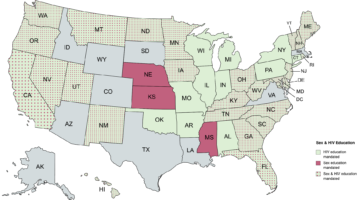Why Teens Have Better Sexual Health in the Netherlands than the US
May 19, 2017 by Justin Lehmiller
The next unit in my Amsterdam study abroad course focuses on sexual health and sex education. As a starting point, I shared some statistics with my students highlighting just how dramatically different teens’ sexual health outcomes are in the Netherlands compared to the United States. So that you can get some sense of this, too, I’ve put together the infographic below, which reveals that teen girls in the Netherlands have far lower rates of pregnancy, birth, and abortion. Below, we’ll discuss why.

As you saw above, teenage girls in the U.S. have a pregnancy rate that’s about four times higher and an abortion rate that’s about twice as high as Dutch girls of the same age [1]. Though not shown in this infographic, Dutch girls (and boys) have much lower rates of sexually transmitted infections, too [2]. So what accounts for the superior sexual health outcomes of teens in the Netherlands?
It’s not just one thing—the entire cultural view of sex is different here. For one thing, the Dutch have mandated comprehensive sex education for all students. This occurs at all grade levels with age-appropriate material. As part of their education, students are provided with medically accurate information and they have their questions answered honestly. In other words, students actually learn a thing or two about sex (how novel, right?). By contrast, most U.S. states do not currently require any sex education at all and those that do tend to stress abstinence and the negative outcomes of sex. Further, only a handful of states actually require that sex education be medically accurate. Some states go further and place explicit restrictions on what sex educators can and can’t discuss (e.g., some states don’t allow discussion of sexual orientation). The net effect is that many American students aren’t being taught want they want or need to know.
Differences in sex education are just one part of this equation, though. It’s also important to highlight that in Dutch culture, sex is viewed as a normal and natural component of adolescent development and maturation, parents and healthcare providers speak candidly with teens about sex, and teens have ready access to free or low-cost contraception. In light of this, it is perhaps not surprising that Dutch teens have much higher rates of condom and contraceptive use compared to their American peers [2].
What all of this tells us is that if we want to enhance teens’ sexual health in the US, we’ve got our work cut out for us. There are no simple or easy solutions. Yes, we desperately need to change our approach to school-based sex education, but that’s not enough. We also need to change the way the country thinks about teenage sex. This means moving away from the view that teen sex is always a problem and failure of character and toward the view that it can potentially be a part of normal and healthy development. It also means changing the climate of shame that stifles open dialogue about sex and promoting positive sexual communication skills for parents and teens alike.
Follow the blog to keep up on what we’re learning on our study abroad trip, or learn more about our other adventures by following me on Twitter @JustinLehmiller
Want to learn more about Sex and Psychology? Click here for more from the blog or here to listen to the podcast. Follow Sex and Psychology on Facebook, Twitter (@JustinLehmiller), or Reddit to receive updates. You can also follow Dr. Lehmiller on YouTube and Instagram.
[1] Sedgh, G., Finer, L. B., Bankole, A., Eilers, M. A., & Singh, S. (2015). Adolescent pregnancy, birth, and abortion rates across countries: Levels and recent trends. Journal of Adolescent Health, 56(2), 223-230.
[2]Alford, S., & Hauser, D. (2011). Adolescent sexual health in Europe and the US.
Image Source: 123RF/Mirko Vitali

Dr. Justin Lehmiller
Founder & Owner of Sex and PsychologyDr. Justin Lehmiller is a social psychologist and Research Fellow at The Kinsey Institute. He runs the Sex and Psychology blog and podcast and is author of the popular book Tell Me What You Want. Dr. Lehmiller is an award-winning educator, and a prolific researcher who has published more than 50 academic works.
Read full bio >


